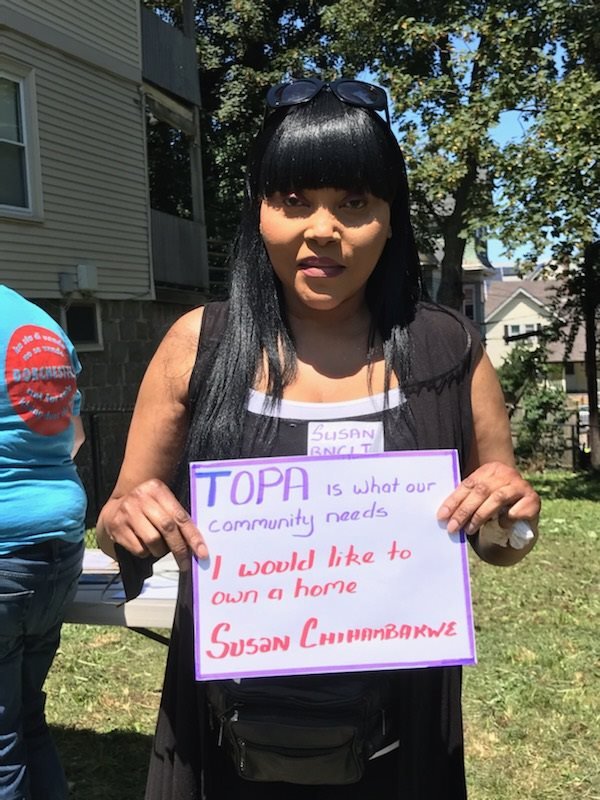
Policy Priorities
Tenants Opportunity to Purchase Act (TOPA)
Status:
July, 2022 TOPA (as amendment 508) did not make it into the Economic Development bill. Our movement to pass TOPA will continue into the future.
Action: Continue to talk with your State Reps and Senators to encourage them to pass TOPA.
Background
TOPA, the Tenant Opportunity to Purchase Act (also known as An Act to Guarantee a Tenant’s First Right of Refusal) -- an Enabling Act -- is a major tenant protection and anti-displacement proposal, allowing tenants the right to purchase their building at point of sale. This is a way for buildings to be taken off the speculative market and made affordable, providing long lasting housing security and stable communities.
In municipalities that adopt TOPA, owners are required to notify building tenants and the municipality when they decide to sell a building. Tenants can form a Tenant Association and/or designate their rights to a Designee. They have 30 days to make a first offer before the owner can accept another offer, and another 30 days to agree to terms of contract or make a counter-offer. They then have 160 days to perform due diligence, secure financing, and close on the purchase. The TOPA Enabling Act also has a tenant opportunity to purchase for short sales and foreclosures.
TRANSFER FEE
Status
Summer, 2022: Transfer fee bill heard at the State House
Spring, 2021: Several municipalities, including Boston, Somerville, Nantucket, Provincetown, Concord, and Brookline, have already passed local home rule petitions, each of which now requires approval by the State House. Others, including Cambridge, Arlington, and Watertown, are actively considering such policies.
A growing coalition of grassroots organizations, non-profits, and elected officials is now working to pass a “local option” bill that would allow cities and towns to enact a small real estate transfer fee to address their own housing needs.
Summer, 2020: Encourage Legislature to pass State enabling legislation this session.
Spring, 2020: On hold given COVID-19 Emergency.
February, 2020: The bill was voted out of the Joint Committee on Housing and referred to both House Ways and Means and Senate Ways and Means.
Action: Continue to talk with your State Reps and Senators to encourage them to pass the Enabling Legislation for Transfer Fee. For more information, visit https://www.realestatetransferfee.org/
Background:
Enabling legislation for Transfer Fee would authorize municipalities to charge a fee of between 0.5% and 2% for real estate transactions above the statewide median sale price for single family homes (currently $430,000) or above the median sale price for single family homes for the county if the locality’s median is higher than the statewide median to allow for as many municipalities as possible to be able to implement such a fee if they so choose All funds raised by a municipality’s transfer fee would pay for affordable housing in that municipality. As this is only enabling legislation, an extensive community process would still need to take place in each locality.
Real estate transfer fees are a widely used revenue generating vehicle. According to a 2018 update by the National Council of State Legislatures, real estate transfer fees were assessed in 37 states (statewide, by counties, and/or by jurisdictions) and the District of Columbia. Home Rule Petitions for real estate transfer fees are now pending at the State House for Boston, Brookline, Concord, Nantucket, Provincetown, Somerville and Truro and are being considered by many other localities that desperately need revenue for affordable housing. This growing demand for local authority to respond to the housing crisis makes transfer fee enabling legislation the logical path forward.
Boston’s Linkage Program and Inclusionary Development Policy (IDP)
Status
April, 2022: City Council Hearing
Action:
Please contact your State Representative and ask them to speak to Leadership to move and pass the Inclusionary Development Program (IDP)/Linkage Boston Home Rule Petition
Background:
Linkage fees are paid by developers who build commercial buildings over 100,000 square feet in the city of Boston. The funds generated by this program partially offset the increased need for affordable housing and job training directly tied to that increased development.
This home rule petition makes changes to the city of Boston's Linkage Program and Inclusionary Development Policy (IDP). This would enable the city to adjust its local Development Impact Fees, or “Linkage Fees”. While neighboring Cambridge and Somerville already have this authority and have been able to successfully adjust their linkage programs in response to changes in the economic environment, adjustments in Boston must be approved by the full legislature. Given the volume of important bills filed each year, including the state budget, it can take years to respond to immediate local needs. The City is asking to be able to manage linkage “in real time”, working with stakeholders, including residents and the development community.
This home rule petition also codifies the existing IDP program into Boston's zoning code, thereby protecting Boston's ability to create and fund income-restricted affordable housing.
